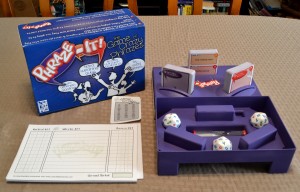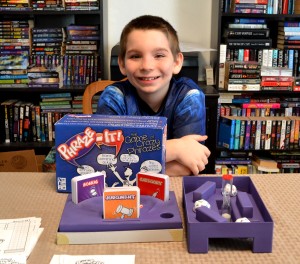Are you the type of person that just HAS to come up with silly words to fit acronyms when you see them? Do you excel at games like “Scrabble” and “Jumbulaya” because your vocabulary knows no bounds? Are you witty and quick with clever comebacks in verbal sparring matches? If the answer is yes to any of these questions, then “Phraze-It!” might be right up your alley. In this easy to learn game for kids and adults alike, you’ll be tasked with coming up with phrases that fit the letters that are randomly rolled from turn to turn. Before we take a quick look at the game, I’d like to thank Todd Greenwood from Lots-o-Watts Games for providing me with a prototype copy. It’s important to stress that the components featured in previews aren’t always representative of the final product.
For as simple as this game is, there’s a lot of content in which to sink your teeth into. The game comes with three different decks of cards at fifty-four cards each, three thirty-sided letter dice, a multiplier die, a sand timer, sheets & pencils, and a few other goodies that are all packed in a convenient tray insert. The three decks of cards are broken up into “Bonus” cards, “Category” cards, and “Judgment cards…more about those in a minute. The object of the game is to be the player that earns the most points by coming up with the best three-word phrases over the course of several rounds.
Similar to games like “Apples to Apples”, one player will be the designated as the “Judge” on a given turn. The primary role of the Judge is to see the turn to its completion, while at the same time scoring the other players for their performance in various areas. He/She will start the turn by rolling the three thirty-sided letter dice and then choosing the order of the letters that are rolled. The results of which are then noted by the other players on their personal notepads. After that, the “Judge” draws a Category card, reads it aloud, and flips over the timer. A “Bonus” card can also be included in the turn if any of the three letters happen to be vowels. Players have until the time limit expires to come up with a three-word phrase that fits the category.
I know what you’re thinking…that actually sounds pretty difficult, when you think about it. Luckily, the game is very flexible and can cater to younger kids who struggle to come up with something clever. For example, the addition of smaller words like “I”, “is”, or “in” are allowed in order to help the phrase to make more sense. Families can also do away with the sand timer and Bonus cards, giving kids more time to think about their words and how it they might conform to a phrase or short sentence. I personally liked the flexibility behind the rules, as time limits will sometimes set participants back from reaching their full potential. In a competitive adult setting however, time limits and Bonus cards certainly make things more interesting.
Once players are finished writing down the best phrase on their notepads, the Judge will draw a Judgment card. Judgement cards contain varying point values across three categories: “Think-It”, “Write-It”, and “Say-It”. Each player will say the phrase they chose with as much meaning as they can (this factors into scoring). The Judge will then assign points (as noted on the card) to players based off of the rules listed on the card. For example, one card might award players for the most complex phrase (Think-It), the phrase that was the most unique in its creation (Write-It), and the phrase that was said with the most feeling (Say-It). The type of things the judge will look out for, along with the point values, will change from card to card.
Really, that’s all there is to it. Players continue taking turns as the Judge, keeping track of their scores as they go on their personal notepads. Players will all have an equal number of turns as the Judge and after so many complete rounds, the final round will begin. In this part of the game, each player will have one more turn as the Judge, but the multiplier die is used to potentially double or triple scores during a turn. Bonus cards are also used, regardless of whether or not the Judge rolled vowels. The person with the most points at the end of it all, wins! There’s a few details that I left out, but the above should give you a taste as to what the game has to offer.
“Phraze-It!”, in all honesty, is a great idea at its core. It promotes creative thinking and serves as a great learning tool in the areas of spelling and vocabulary. Not only is “Phraze-It” educational, but it allows adults and kids alike to let their hair down a little in the process. I felt that there were a good mix of mechanics going on, what with the Bonus cards and different ways to score. It kept things interesting, despite the quote unquote “simple” task of coming up with a short phrase. This is definitely one game that I can get behind, be it on family game night or at parties. I highly recommend giving it a look, especially if you and your family enjoy word-themed games.
—
At the time of writing (8/28/13), “Phraze-It!” is currently being funded through Kickstarter. You can learn more about and support the game by visiting the following websites:
http://www.kickstarter.com/projects/1916949327/phraze-it-the-game-of-crazy-phrases?ref=search
http://www.lotsowattsgames.com/
—


